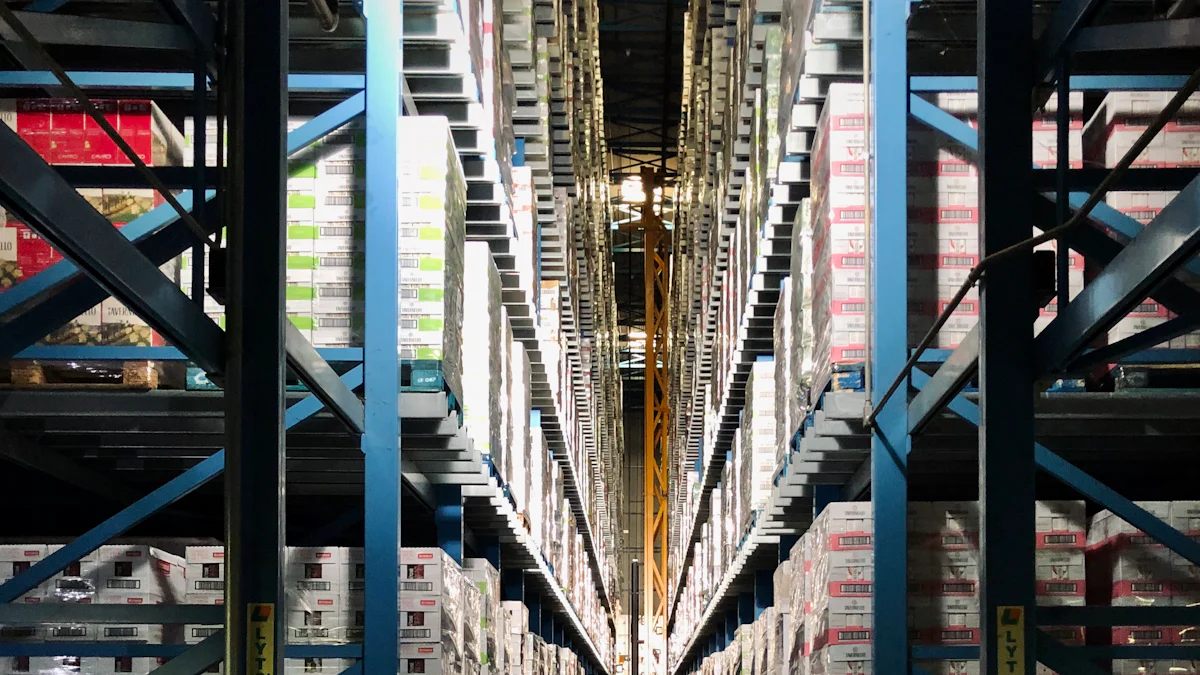Boosting Automotive Supply Chain Efficiency with Proven Methods

In the realm of the automotive industry, supply chain efficiency stands as a cornerstone for success. Challenges like disruptions and inventory management intricacies have underscored the need for streamlined operations. Embracing proven methods is pivotal in enhancing efficiency, ensuring smoother processes from suppliers to end-users.
Understanding the Automotive Supply Chain

Key Components of the Automotive Supply Chain
Suppliers and Manufacturers
Suppliers and manufacturers play a crucial role in the automotive supply chain by providing essential components and assembling vehicles with precision.
Distributors and Dealers
Distributors and dealers act as intermediaries, ensuring that vehicles reach customers efficiently and effectively, bridging the gap between production and consumption.
Logistics and Transportation
Logistics and transportation form the backbone of the automotive supply chain, orchestrating the movement of parts and vehicles from suppliers to manufacturers to end-users seamlessly.
Proven Methods to Boost Supply Chain Efficiency
Implementing Lean Manufacturing Principles
Reducing Waste
Reducing waste is a fundamental aspect of enhancing supply chain efficiency. By eliminating unnecessary steps and optimizing processes, companies can streamline operations and maximize productivity.
Focusing on cutting-edge technology aids in adapting inventory management practices to reduce waste effectively. This proactive approach ensures that resources are utilized efficiently, minimizing excess inventory and operational costs.
Continuous Improvement (Kaizen)
Embracing a culture of continuous improvement, known as Kaizen, fosters a mindset of ongoing enhancement within the organization. This commitment to incremental progress drives efficiency gains and operational excellence.
Exploring successful examples like Toyota's Production System showcases the power of continuous improvement in achieving operational efficiency. By constantly refining processes and workflows, companies can stay agile and responsive to market demands.
Leveraging Technology and Automation
Use of IoT in Supply Chain Management
Harnessing the potential of the Internet of Things (IoT) revolutionizes supply chain management by providing real-time visibility into operations. This data-driven approach enhances decision-making processes and optimizes resource allocation.
Discussing the choice between Just-In-Time (JIT) and Just-In-Case (JIC) inventory management strategies highlights the importance of leveraging IoT technologies for accurate demand forecasting and inventory optimization.
Automation in Warehousing and Distribution
Implementing automation in warehousing and distribution facilities streamlines material handling processes, reducing lead times and improving order fulfillment rates. Robotics play a pivotal role in enhancing operational efficiency while minimizing errors.
The adoption of computer-aided software engineering (CASE) technologies further improves warehouse productivity by automating various tasks, increasing overall equipment effectiveness, and ensuring seamless operations.
Enhancing Supplier Relationships
Strategic Partnerships
Cultivating strategic partnerships with key suppliers fosters collaboration, innovation, and mutual growth opportunities. These alliances enable companies to access new markets, share expertise, and drive collective value creation.
Enhanced supplier selection helps minimize risks associated with the supply chain by ensuring reliability, quality assurance, and timely deliveries. By establishing strong partnerships based on trust and transparency, companies can enhance their supply chain resilience.
Supplier Performance Management
Effective supplier performance management involves setting clear expectations, monitoring key metrics, and providing feedback for continuous improvement. By evaluating supplier performance regularly, companies can identify areas for enhancement and drive accountability.
Efficient demand forecasting in the automotive industry helps optimize inventory levels by ensuring that the right vehicles are available at the right time to meet customer demands effectively.
Optimizing Inventory Management
Just-In-Time (JIT) Inventory
Just-In-Time (JIT) Inventory management is a strategic approach that emphasizes efficiency by receiving goods only as they are needed in the production process. This method minimizes excess inventory, reduces storage costs, and enhances supply chain efficiency by synchronizing production with demand.
Implementing JIT principles enables companies to streamline operations, improve responsiveness to market fluctuations, and optimize resource utilization effectively.
Embracing JIT practices fosters a leaner and more agile supply chain, ensuring that materials flow seamlessly from suppliers to manufacturers without delays or bottlenecks.
The successful implementation of JIT inventory systems has been exemplified in various industries, showcasing significant improvements in operational efficiency and cost savings.
Advanced Inventory Analytics
Utilizing Advanced Inventory Analytics empowers automotive companies to make data-driven decisions regarding inventory levels, demand forecasting, and supply chain optimization. By leveraging cutting-edge technology and analytical tools, organizations can enhance visibility into their inventory processes and drive continuous improvement initiatives.
Advanced analytics provide valuable insights into consumer trends, supplier performance, and inventory turnover rates, enabling companies to adapt quickly to changing market demands.
Incorporating predictive analytics models aids in anticipating future inventory needs, reducing stockouts, and optimizing warehouse space utilization for maximum efficiency.
The integration of advanced inventory analytics with existing systems enhances decision-making capabilities, streamlines operations, and ultimately boosts overall supply chain efficiency.
Proactive Risk Management
Identifying and Mapping Supply Chain Risks
Identifying and Mapping Supply Chain Risks is a critical step in mitigating potential disruptions within the automotive supply chain. By proactively identifying vulnerabilities and mapping out risk factors across the entire supply network, companies can develop robust contingency plans to ensure continuity of operations.
Conducting thorough risk assessments helps automotive manufacturers anticipate challenges such as supplier delays, natural disasters, or geopolitical issues that may impact the supply chain.
Mapping out supply chain risks enables companies to visualize interconnected dependencies among suppliers, manufacturers, distributors, and dealers, facilitating proactive risk mitigation strategies.
Implementing real-time monitoring systems and early warning mechanisms enhances the ability to detect potential risks promptly and respond effectively to minimize operational disruptions.
Implementing Mitigation Strategies
Implementing Mitigation Strategies involves developing proactive measures to address identified risks effectively. By establishing contingency plans tailored to specific risk scenarios and implementing preventive actions in advance, automotive companies can safeguard their supply chains against unforeseen events.
Creating diversified sourcing strategies helps mitigate risks associated with single-source dependencies by spreading procurement across multiple suppliers or regions.
Collaborating closely with key stakeholders such as suppliers and logistics partners strengthens communication channels and enables swift responses during crisis situations.
Regularly reviewing mitigation strategies based on evolving risk landscapes ensures that automotive manufacturers remain adaptive and resilient in the face of dynamic market conditions.
Green Supply Chain Management
Waste Reduction Techniques
Embracing Waste Reduction Techniques aligns with sustainable practices in the automotive industry by minimizing environmental impact while enhancing operational efficiency. By optimizing processes to reduce waste generation throughout the supply chain lifecycle, companies can achieve cost savings while promoting eco-friendly operations.
Implementing lean manufacturing principles like waste segregation and recycling promotes resource conservation while reducing landfill waste generated during production processes.
Investing in renewable energy sources for manufacturing facilities reduces carbon emissions associated with energy consumption while contributing to a greener supply chain ecosystem.
Engaging suppliers in sustainability initiatives encourages the adoption of environmentally friendly practices across the entire value chain, fostering a culture of responsible resource management.
Sustainable Practices
Adopting Sustainable Practices underscores a commitment to environmental stewardship within the automotive industry. By integrating eco-conscious initiatives such as carbon footprint reduction programs or circular economy models into supply chain operations,
companies can enhance brand reputation while driving long-term sustainability goals.
Incorporating green logistics solutions like electric vehicles for transportation reduces greenhouse gas emissions associated with traditional fuel-powered fleets,
contributing to cleaner air quality and reduced environmental impact along distribution routes.
Leveraging smart technologies such as route optimization software minimizes fuel consumption,
lowers transportation costs,
improves delivery accuracy,
thereby promoting sustainable transportation practices within the automotive supply chain ecosystem.
Case Studies and Real-World Examples
Successful Implementation of Lean Manufacturing
Case Study 1: Toyota Production System
In the automotive industry, Toyota's Production System exemplifies operational excellence through lean manufacturing practices. By prioritizing efficiency and waste reduction, Toyota has revolutionized the production process, leading to streamlined operations and cost savings.
Key Success Factors:
Implementing Just-In-Time (JIT) inventory management for precise material flow.
Cultivating a culture of continuous improvement to drive operational excellence.
Fostering strong supplier relationships for seamless supply chain integration.
Impact on Efficiency:
Reduced lead times and inventory costs through JIT implementation.
Enhanced product quality and flexibility in response to changing market demands.
Improved overall equipment effectiveness by eliminating non-value-added activities.
Case Study 2: Ford's Lean Transformation
Ford's journey towards lean transformation underscores the significance of adapting traditional manufacturing processes to modern demands. By embracing automation and digital technologies, Ford has optimized its supply chain operations, enhancing productivity and customer satisfaction.
Strategic Approaches:
Integrating robotics for efficient assembly line operations.
Leveraging data analytics for demand forecasting accuracy.
Enhancing sustainability initiatives for eco-friendly manufacturing practices.
Outcomes Achieved:
Increased production output while minimizing waste generation.
Improved resource utilization through smart factory implementations.
Strengthened competitiveness in the market by aligning with green supply chain principles.
Technology and Automation Success Stories
Case Study 1: Tesla's Automated Warehousing
Tesla's innovative approach to automated warehousing showcases the transformative power of technology in optimizing logistics processes. By deploying robotic systems and AI-driven solutions, Tesla has revolutionized its warehouse operations, ensuring seamless material flow and operational efficiency.
Technological Advancements:
Integration of autonomous vehicles for internal material transport.
Implementation of RFID tracking systems for real-time inventory monitoring.
Operational Benefits:
Enhanced order fulfillment rates through automated picking processes
Reduced error rates in inventory management with AI-powered systems
Increased warehouse throughput capacity by streamlining workflows
Case Study 2: BMW's IoT Integration
BMW's strategic integration of Internet of Things (IoT) technologies highlights the role of connectivity in driving supply chain optimization. By leveraging IoT sensors and data analytics, BMW has enhanced visibility across its supply network, enabling proactive decision-making and adaptive resource allocation.
IoT Applications:
Monitoring vehicle performance data in real-time for predictive maintenance
Tracking component shipments to ensure timely production schedules
Business Impact:
Improving production efficiency by reducing downtime with predictive maintenance
Optimizing inventory levels based on real-time demand insights
Strengthening supplier collaboration through data-driven transparency
Future Trends in Automotive Supply Chain Efficiency

Emerging Technologies
Artificial Intelligence and Machine Learning
Implementing Artificial Intelligence (AI) and Machine Learning (ML) technologies revolutionizes supply chain operations by enhancing predictive analytics, optimizing route planning, and automating decision-making processes.
Leveraging AI algorithms for demand forecasting ensures accurate inventory management, reduces stockouts, and improves overall operational efficiency.
Applying ML models to analyze historical data enables automotive companies to identify patterns, anticipate market trends, and make informed decisions that drive supply chain optimization.
Blockchain for Supply Chain Transparency
Integrating Blockchain technology enhances supply chain transparency by providing a secure and decentralized platform for tracking transactions, verifying product authenticity, and ensuring data integrity throughout the supply network.
Utilizing blockchain-enabled smart contracts streamlines procurement processes, minimizes disputes between stakeholders, and promotes trust through transparent and immutable transaction records.
Implementing blockchain solutions in the automotive industry strengthens traceability efforts, mitigates counterfeit risks, and fosters a culture of accountability among suppliers, manufacturers, and distributors.
In the ever-evolving automotive landscape, supply chain efficiency emerges as the linchpin for sustained success. The amalgamation of proven methods, from lean manufacturing to advanced technologies like IoT and automation, paves the path for unparalleled operational excellence. Looking ahead, embracing emerging trends such as Artificial Intelligence and Blockchain will further propel the industry towards unprecedented efficiency and resilience. Industry professionals are urged to seize this transformative moment, adopt these strategies fervently, and steer the automotive supply chain into a future defined by innovation and optimization.
See Also
Unlocking the Power of Your Automotive Supply Chain
Mastering Hurdles in the Automotive Supply Chain: Pro Advice
Ensuring Triumph: Applying Leading Supply Chain Enhancement Techniques
Efficient Resolutions for High-Tech Manufacturing's Supply Chain Challenges
